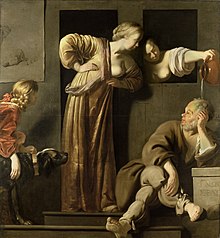Myrto

Myrto(/ˈmɜːrtoʊ/;Greek:Μυρτώ;fl. 5th century BC) was, according to some accounts, a wife ofSocrates.
Sources[edit]
The original source for the claim that she was Socrates' wife appears to have been a work byAristotlecalledOn Being Well-Born,[1][2][3]althoughPlutarchexpresses doubt that the work is genuine. She was apparently the daughter,[3]or, more probably, the granddaughter ofAristides.[2]A different account of Xanthippe and Myrto is given inAristoxenus'sLife of Socrateswritten in the latter part of the fourth century BC that Aristoxenus asserts is based on first-person accounts by his father. This claims that Myrto was his legitimate wife and Xanthippe his mistress, whose child became legitimate.[4]
AlthoughDiogenes Laërtiusdescribes Myrto as Socrates' second wife living alongsideXanthippe,Myrto was presumably acommon-law wife,[5]and Plutarch describes Myrto as merely living "together with the sage Socrates, who had another woman but took up this one as she remained a widow due to her poverty and lacked the necessities of life."[2]Athenaeusand Diogenes Laërtius report thatHieronymus of Rhodesattempted to confirm the story by pointing to a temporary decree the Athenians passed:
For they say that the Athenians were short of men and, wishing to increase the population, passed a decree permitting a citizen to marry one Athenian woman and have children by another; and that Socrates accordingly did so.
— Diogenes Laërtius, ii. 26
NeitherPlatonorXenophonmention Myrto, and not everyone in ancient times believed the story: according to Athenaeus,Panaetius"refuted those who talk about the wives of Socrates."[1]

